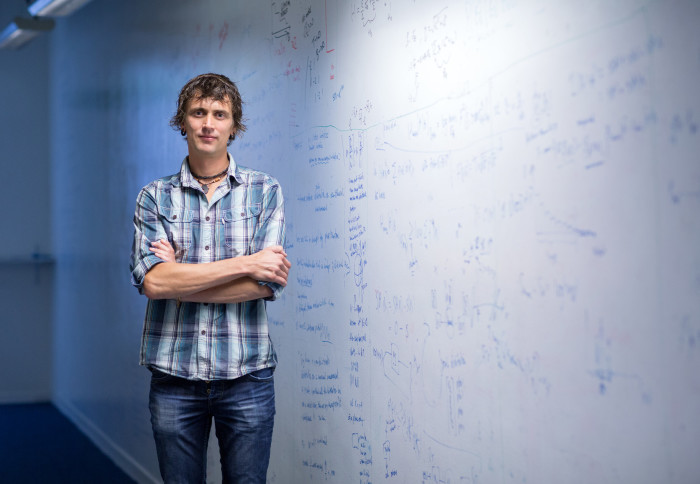PsiQuantum, with links to Imperial research, reaches multi-billion valuation

Quantum computer company PsiQuantum, co-founded by Imperial’s Professor Terry Rudolph, has received $450 million from investors.
The company, which was founded using theoretical insights developed at Imperial College London and the University of Bristol, hopes to become the first to develop a fully functional and commercially viable quantum computer.
PsiQuantum is now valued at $3.15 billion, attaining ‘unicorn’ status and becoming one of the world’s most valuable quantum technology companies.
The $450 million series D funding round was led by funds and accounts managed by BlackRock alongside other investors including Microsoft’s venture fund M12, and means the company has now raised a total of $665 million. PsiQuantum will use the funding to expand its 150-strong team in the USA, UK and Europe. This will progress efforts to build the world’s first commercially viable one million qubit quantum computer.
The symbiosis of fundamental research and radically transformative technology is at the heart of Imperial’s ethos. Professor Ian Walmsley Imperial Provost
Quantum computers have the potential for some applications to offer exponential increases in computing power over classical computers by harnessing the quantum properties of particles. Using these properties, quantum computers process information in qubits, which unlike bits can be in a superposition of two states simultaneously. This could eventually yield transformational advances in industrial fields such as drug discovery and materials discovery.
While quantum computers already exist, they are currently too small to correct errors – a feature that is critical to making them useful. The challenge lies in finding an approach to quantum computing that is scalable and can be mass produced. PsiQuantum’s photonics-based approach, which arises out of research carried out at Imperial, uses photons, which will be manipulated via photonics circuits built into silicon chips.
PsiQuantum was founded in 2016 by a team of academics from Imperial and the University of Bristol including its Chief Architect, Professor Terry Rudolph, a quantum physicist who maintains his professorship at Imperial, and fellow UK scientist Professor Jeremy O’Brien, the company’s CEO.
The big breakthrough came when we realised we could make the machine in silicon. It was the PhD thesis of Mercedes Gimeno-Segovia. Her PhD suggested we can build this thing if we get it into a silicon foundry. Professor Terry Rudolph
The company is aiming to manufacture its quantum computers at scale, taking advantage of its distinctive technology and its Silicon Valley headquarters, which allow it to access the region’s semiconductor industry and expertise in traditional electronics engineering and advanced semiconductor manufacturing processes.
Professor Rudolph said: “PsiQuantum is leveraging the only industry on the planet that can hope to build quantum computing machines out of millions and billions of components – it is their engineers who say our quantum computer can be built at scale and they are very serious companies.”
Professor Ian Walmsley, Imperial's Provost and co-founder of quantum computer company ORCA Computing, said: “Quantum computing is a technology with potential to solve otherwise intractable problems. So there is a race to build a machine that can do so. Photonics is one of the promising ways to construct a large scale quantum computer, and it is great to see Imperial scientists at the cutting edge of innovation in this area. The symbiosis of fundamental research and radically transformative technology is at the heart of Imperial’s ethos.”
UK success story

Professor Rudolph said that the company’s success reflects the sense of mission among quantum technology researchers. “Most companies are led by people who had very successful academic careers, but you feel your impact on the world is very great if you can build a quantum computer – it’s a real change in our capacity as a species. If there is any chance of making this work, you have an obligation to try.”
“The big breakthrough came when we realised we could make the machine in silicon. It was the PhD thesis of Mercedes Gimeno-Segovia from the EPSRC Centre for Doctoral Training in Controlled Quantum Dynamics. Her PhD suggested we can build this thing if we get it into a silicon foundry.” Dr Gimeno-Segovia, who went on to a postdoctoral fellowship at the University of Bristol, is now Senior Director of Quantum Architecture at PsiQuantum. Other Imperial alumni at the company include Dr Naomi Nickerson who is also Senior Director of Quantum Architecture.
Professor Rudolph said the role of Imperial researchers reflects the College’s and the UK’s strength in the field of quantum technology. “You go wherever you get the best educated people – the UK really punches above its weight. Most of our UK-trained quantum engineers come from Imperial. Several more come from Bristol.”
You go wherever you get the best educated people – the UK really punches above its weight. Most of our UK-trained quantum engineers come from Imperial. Professor Terry Rudolph
Writing in the Financial Times in 2019, Professor Walmsley said that PsiQuantum is a UK success story. He wrote: “The UK has a decades-long head start in quantum technologies. Consistent support from research councils and university departments have spurred crucial breakthroughs. These leaps in fundamental science — all from British laboratories — are the foundation of today’s global industry.”
PsiQuantum maintains links to Imperial through Professor Rudolph, its recruitment pipeline and its use of some Imperial intellectual property. It is developing plans with Imperial to fund collaborative research at the College.
Article text (excluding photos or graphics) © Imperial College London.
Photos and graphics subject to third party copyright used with permission or © Imperial College London.
Reporter
David Silverman
Communications Division